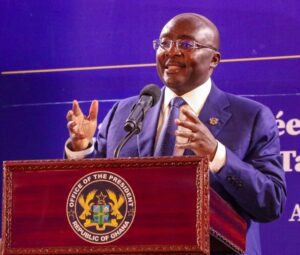Bawumia states four major issues that sent Ghana to the IMF

The Vice President, Dr Mahamudu Bawumia, Thursday said four key issues compelled Ghana to opt for balance of payment support from the International Monetary Fund (IMF) to resuscitate the economy.
They are the GH¢17 billion energy sector excess capacity payments, GH¢25 billion expenditure on the banking sector clean-up exercise and GH¢12 billion expenditure on COVID-19 social interventions, as well as the Russia-Ukraine conflict, increasing prices of fuel on the world market.
He said the three items of expenditures – Banking Sector Clean-up, Energy Sector Excess Capacity Payment and COVID-19 social interventions – amounted to GH¢54 billion, equivalent to $7 billion.
The money was borrowed with an estimated interest payment of GH¢8.5 billion annually, and represented some 23 per cent of Ghana’s annual interest payments of GH¢37 billion, Dr Bawumia added.
Dr Bawumia made the remarks at the Accra Business School at Baatsona, Accra, when he launched three Information Technology programmes for the School.
It was on the theme: “The Role of Information Technology Education in the Government’s Digitalisation Agenda.”
He said: “If you take out the fiscal impact of this quadruple whammy, Ghana will not be going to the IMF for support because our fiscal, debt and balance of payments outlook would be sustainable.
“Of the four factors, two (COVID-19 and the Russia Ukraine war) were external and the other two (the banking sector clean up and the excess capacity payments) were the result of policies of the previous government,” Dr Bawumia emphasised.
Dr Bawumia said all over the world, fuel prices were rising in virtually every country, food prices had risen, inflation was at a record high in many years, whilst currencies of many countries were falling in value, fiscal deficits and debt stock increased.
“Let me give you an analogy to make my point. If you ask a carpenter to roof your house and suddenly the roof collapses without any wind or rainfall, will you not blame the carpenter who did the roofing?
“But if a carpenter roofs your house and the roof collapses because of a tornado and a storm, which has also blown away the roofs, windows and walls of many houses, will you blame the carpenter?
“Some commentators and analysts have argued that COVID-19 expenditures alone could not be the reason for the large increase in the fiscal deficit and the debt stock.
“In fact, they are right. COVID-19 expenditures alone were not the reason for the large increase in Ghana’s debt stock by the end of 2021,” he said.
The Vice President said the excess capacity payments of GH¢17 billion related to a legacy of take or pay contracts that saddled the economy with annual excess capacity charges of close to $1 billion was a contributory factor.
“These were basically contracts to supply energy to Ghana way in excess of our requirements, but we were obligated to pay for the power whether we used it or not.
“The excess capacity payments includes GH¢7 billion of payments for gas resulting from the previous government signing an offtake agreement for a fixed quantity of gas with ENI Sankofa on a take or pay basis which was way in excess of what was needed at the time. Not keeping up with the excess capacity payments would have meant throwing the country back into a new bout of dumsor.
“We were also confronted with a banking crisis as a result of the mismanagement of the banking sector. Ghana’s banking system was on the verge of collapse and not dealing decisively with it would have meant disaster for the economy with millions of people losing their savings,” the Vice President added.
The expenditure on the three exceptional items amounted to more than three times the expenditure on Government’s flagship programmes over five years, Dr Bawumia added.
Meanwhile, as part of measures to shore up Ghana’s gold reserves to stabilise the depreciating Cedi, Dr Bawumia said, the Government had enacted a policy to grant the Bank of Ghana the first right to purchase gold produced in Ghana.
“After the Central Bank had purchased the gold at world market prices, the mining companies could export the remainder,” the Vice President said
“Ultimately, once we accumulate enough gold, future borrowing and our currency can be backed by gold.
“This will stabilised the cedi for a long term,” Dr Bawumia stated.
The Vice-President said the first right of refusal given the Central Bank to purchase gold mined in Ghana was backed by law to deepen the gold purchase programme to build up the country’s reserves.
Source: GNA
